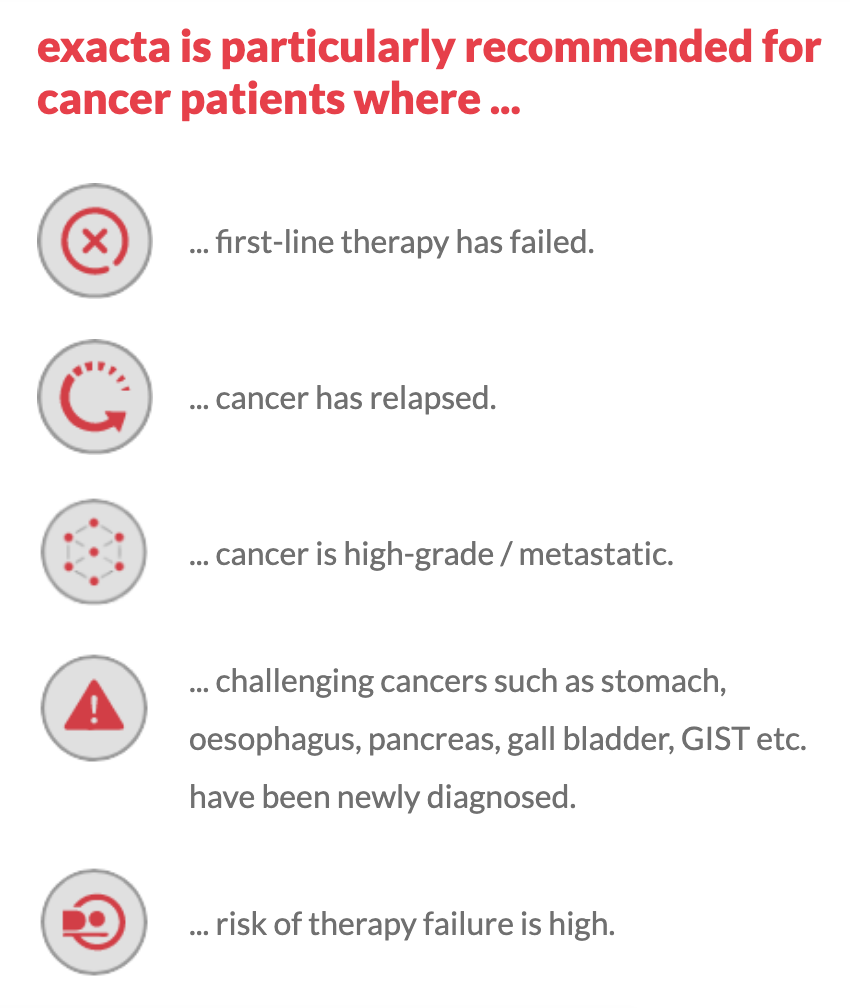The most comprehensive tumour investigation
Exacta offers a thorough examination of the molecular-genetic attributes of solid tumours, drawing upon insights gleaned from numerous clinical investigations. Particularly beneficial for rare solid tumours lacking established guidelines, as well as in complex or challenging-to-treat cases, Exacta provides a distinct advantage. Leveraging millions of molecular-level data points, Exacta identifies all pertinent targets for personalised therapy, facilitating tailored treatment approaches.
ABOUT EXACTA
The traditional 'Standard of Care' approach overlooks the comprehensive genetic makeup of a patient's specific tumour. As a result, patients may face ineffective treatments or recurring aggressive relapses. Therefore, it is crucial to thoroughly analyse the molecular structure of the tumour before formulating a treatment plan. This plan must be personalised to suit the individual patient and their unique disease characteristics.
Exacta offers a comprehensive and in-depth analysis of tumour gene expression. By scrutinising hundreds of millions of data points at the molecular level, it unveils all potential targets for precision drugs.
Exacta assists in uncovering driver mutations and pathways fueling an individual's cancer by conducting multi-analyte and multi-coordinate analysis across 20,805 genes in the cancer genome. This analysis aids in pinpointing drugs that offer optimal efficacy for specific solid tumours. Thus, Exacta empowers the formulation of a highly sophisticated treatment strategy, transcending conventional perspectives, even for challenging-to-treat or late-stage cancers.
METHODOLOGY

Advantages
COMPREHENSIVE
Parameters and Methods of Analysis
* Subject to availability of adequate sample.
100s of Millions of Data Points Analysed
(from Peripheral Blood and / or Fresh Tissue and / or FFPE Block / or Liquor)
Artificial Intelligence / Database based, multi-level iterative algorithm to determine optimum (most favorable + least toxic) drugs and drug combinations.
THERAPY RECOMMENDATIONS
Comparison Chart
Case Studies
SAMPLE REQUIREMENTS
40 ml blood in STRECK and EDTA tubes
Optional: 40 ml blood in STRECK and EDTA tubes as well as fresh tissue sample in DCGL transport media (4-6cm3 or 5 cores);
Alternative: FFPE tissue block
Precautions:
Please wait 24 hours after chemotherapy/PET-CT/MRI, before sampling blood.
Please wait 10 days after blood transfusion.
Turn Around Time (TAT):
10 - 14 days from receipt of the sample
FAQ
If two patients have the same histopathological cancer type, and one of them undergoes exacta analysis, can the other patient receive the same treatment as indicated for the first patient?
Just as each patient is unique, so is each cancer. No two patients’ cancers are alike. Even two similar patients (e.g. age, gender, height, lifestyle) with the same type of cancer will have different molecular tumour profiles. Hence, each patient should perform an individual Exacta test.
Why is it important to start treatment immediately?
Cancer can be very aggressive and may evolve rapidly; the tumour profile can change dramatically over time. If there is a long enough delay the cancer may gain resistance to treatments and re-analysis may be required.
What kind of drugs will be recommended to the patient?
Only drugs that have been approved by the FDA will be recommended and be administered. These will include drugs that are FDA approved for use in same cancer / other cancer / other non-cancerous diseases.
Are there any follow-up molecular tests to assess the result of recommended therapy?
Molecular tests like our cancertrack analysis allow the oncologist to monitor the therapy in real time. In addition, the test provides insights on genetic changes of the original tumour to adapt the therapy.
CONTACT
Cancer Profiling Australia
903/50 Clarence Street,
SYDNEY NSW 2000
PH +61 1300 282 482
FAX +61 2 8088 7097
Email: info@cancerprofiling.com.au















